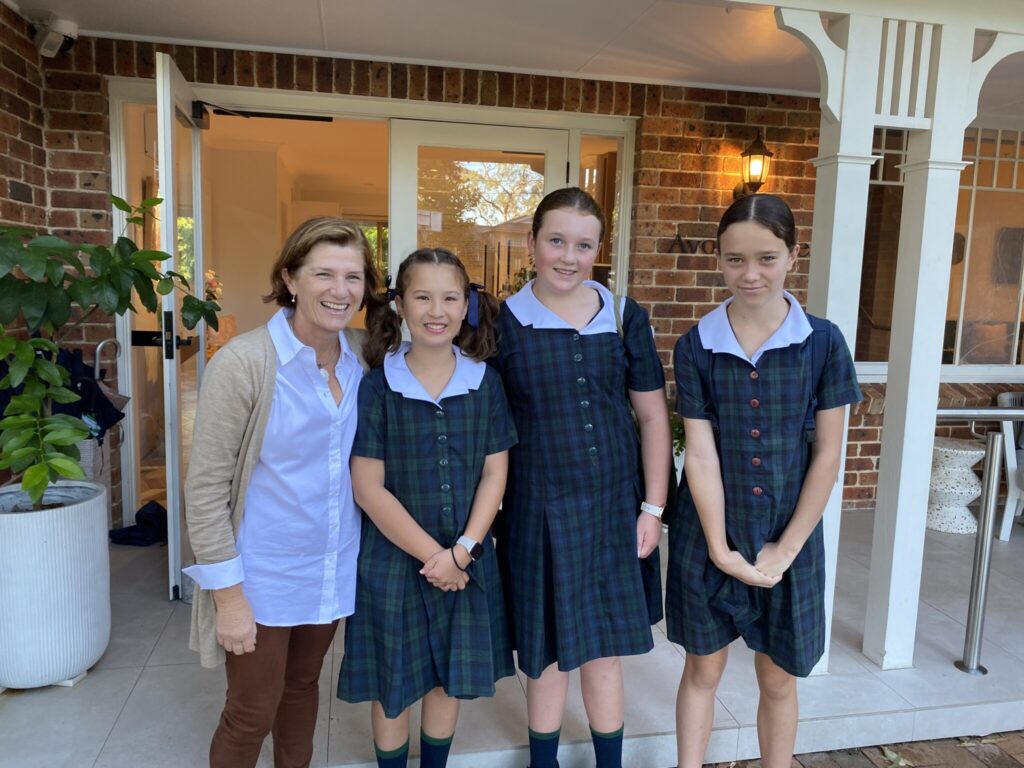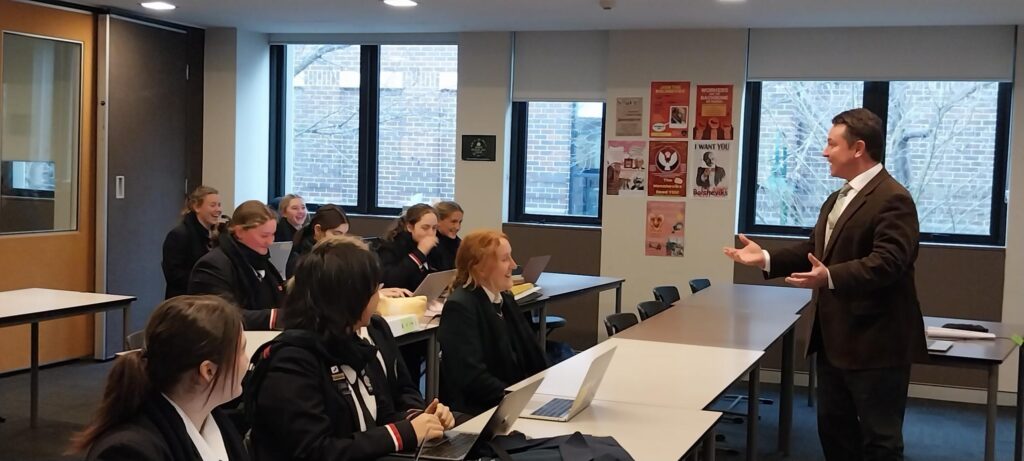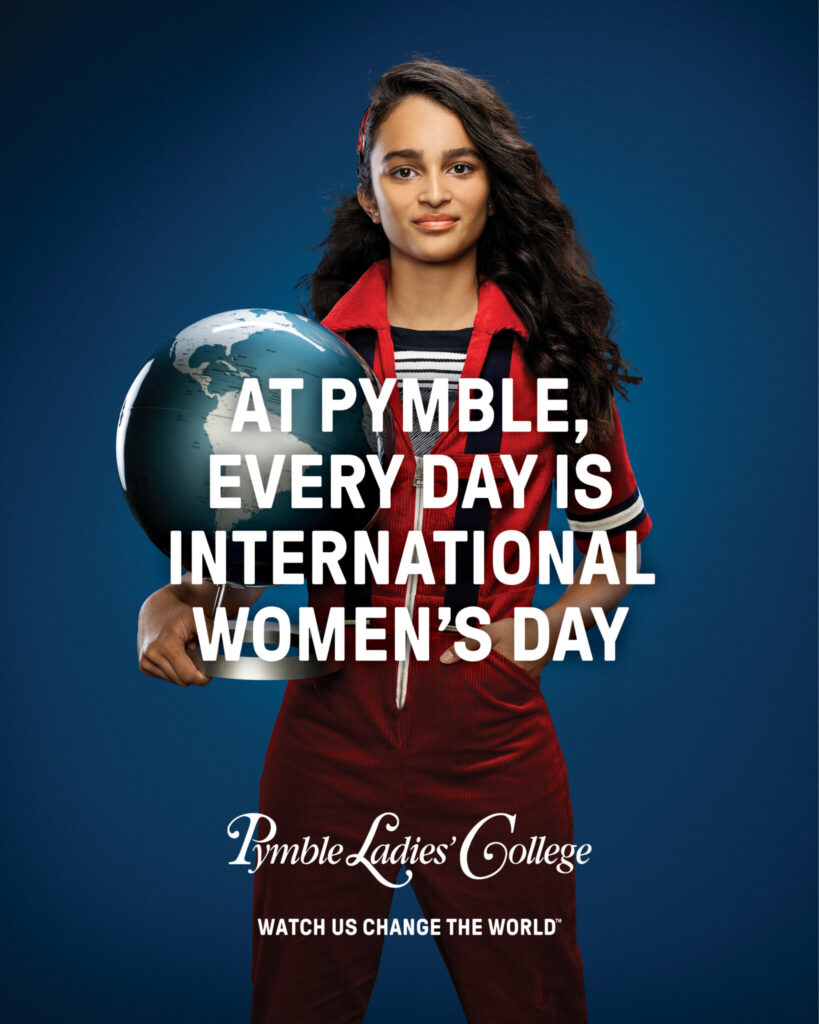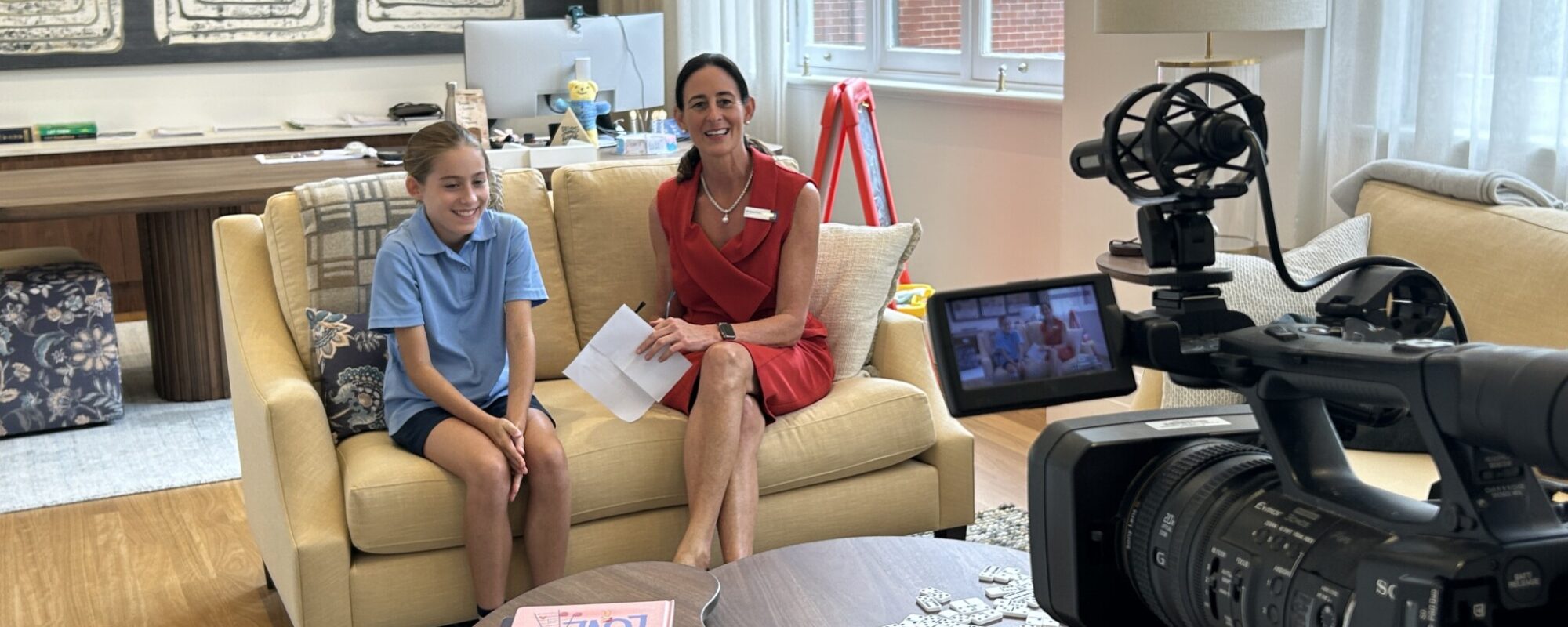From the Principal
This week, I had the pleasure of being shadowed by one of our delightful Junior School students, Charlie in Year 6. Charlie attended meetings with me and even fronted an online assembly which would have been in the gymnasium had it not been for the rain on Tuesday. When asked by one of our staff what she had learned about my day from her experience, she replied with great perception, “I think Dr Hadwen really enjoys being Principal of this school.” You’ve got that right, Charlie. ❤️ 💙🤍
The focus of our Pymble Foundation Ball: Celebrating our international young women
We always say that every day at Pymble is International Women’s Day and I hope that this message, which is reflected in our IWD poster below, really speaks to and rings true for our community. Our aim is to empower each of our 2,504 students to become compassionate and influential young women who use their education to make the world a better place.
Surrounded as we are by so much support for our girls, it can become easy to overlook the plight of others who don’t enjoy the same degree of privilege. We have such amazing opportunities at Pymble; however, we are all very aware this is not the case for girls and young women in other parts of the world.
Our Head of Social Impact, Mrs Shaw, and I recently spent time with three courageous, wise and compassionate Pymble girls who joined our College family in 2024 after escaping from Taliban-ruled Afghanistan a year or two prior. The girls are students here thanks to the generosity of members of our community who have contributed to the Pymble Foundation bursary program. Their stories remind us that there is still so much work to be done to ensure no girls are left behind as we work towards equality for all.
We are delighted that our Pymble Foundation Ball on Saturday 5 April will raise funds to enable more refugee students to access a Pymble education.
The background…
Malalai, Nawida and Baheshta are all in Year 8. Two of the girls are wards of the state, having been orphaned as young children in Afghanistan, and now live with their “mother”, Mahboba, an Afghan refugee who is now an Australian citizen running an Australian non-profit organisation committed to helping underprivileged women and children in Afghanistan and Australia. The third student has been joyfully reunited with her Mum, Dad and other members of her family after they were granted visas to come to Australia in December last year – more than two years since they last saw each other.
All three girls began their lives in Australia without understanding a word of English. This week, they comfortably answered questions and chatted with us for an hour about life in Afghanistan compared to life as students at Pymble. The girls expressed their love of learning English and playing sport, and their gratitude for the gift of the education they are receiving. They were also hopeful that, one day, their sisters and friends who escaped from Afghanistan with them might have an opportunity to join them at Pymble – a dream we hope to make a reality following the Foundation Gala Ball next month.
Q: What would a normal day in the life be for someone your age back at home?
Baheshta: Girls are not allowed to study, there’s no education, and the women are not allowed to raise their voice. And they not allowed to work and nothing. They just have to stay home and just get married in young age.
Malalai: A few days ago, I talked to my niece and she’s one year younger than me, like, younger six months. If she went to school, she was Year 8, too. When Taliban came, she stopped; it doesn’t allow her to go. I was seeing in her eyes how it was painful for her… she was hope-less and like she wanted to cry but she was holding her tears. It was so hard for her.
Q: What’s the average age when girls get married?
Malalai: From 12 and 13, [the Taliban] start to force the children to get married… they don’t listen to the girls and women, what they say. They just do what they want.
Q: How did you manage to get out of Afghanistan and into Australia?
Baheshta: Well, it was so hard. We tried a few times to get out from there and just go to airport, but the Taliban stopped us. So, the fourth time was eleven of us, me and just other children with one of our teachers. We went to the Pakistan with the car. And then we were there for two days waiting to get through the immigrations. And then it was so hard and then the Taliban was hitting the people with the gun. And some people didn’t get through but we were lucky because we got through.
From Pakistan, Baheshta and Nawida were flown to Sydney in a cargo plane but only allowed to disembark in Brisbane. Each member of their party was placed in COVID isolation for two weeks before being told that Mahboba, who they were coming to live with, was actually in Sydney. This was all conveyed through translators. Eventually, the girls were flown back to Mahboba and their other friends from the orphanage. Today, Mahboba houses her many refugee children in several homes across Sydney.
Q: Do you know any girls and women who would benefit from a Pymble education?
Baheshta: My bestie [from the orphanage] is Negita. She’s the oldest one and she has three sisters. I think one of them, her name is Anahita. She’s in Year 8. She study so hard. I think she’ll love to come to Pymble. Another one, her name is Marwa. I think she’s in Year 7. She also love to come to Pymble because they studying hard and they just working hard, too.
Nawida: [My sister] Reyhana. Whenever I go home she asks me how was the school and what I’m doing, what sports, and when I tell her about that and she gets so happy and she’s like, I’m going to come next year. She’s trying to write and read better because, when I do homework, she comes and sits and look at my homework and she’s like, oh, this looks hard, so I need to study. And she’s trying to improve her maths. I tell her that it’s hard. Maths is hard.
Q: What do you think it would mean for her if she could come to Pymble?
Nawida: Everyone would be happy. My mum [Mahboba] would be so happy.
Baheshta: I think three of us, we are the most lucky children, to come to Australia and study in the best school in Sydney.
Malalai: The students and teachers here, all of them is caring. It was my first time to meet people who cares and love each other and it was so special. When someone [at Pymble] smiles to you, it feels like they’re opening a door for you.
We are actually the lucky ones
Those who know Nawida, Baheshta and Malalai will agree we are the lucky ones to have these incredible young women in our community. We learn so much from them every day and we are so grateful to them for opening a door to their lived experience. For our students especially, it helps gain perspective on the world around them and to appreciate how fortunate they are to come to a school like Pymble.
Our staff also grow from the experience of teaching and mentoring these remarkable young women. One of our exceptional mathematics teachers, Mr Mark Way, completed an action research project last year to document his learnings from teaching our Afghan students and create a resource for others to learn from. In presenting his work last year, Mr Way explained that tutoring and learning from our refugee students has been one of the most enriching opportunities of his career to date.
The Pymble Foundation and I look forward to sharing more about our life-changing bursary program at our Gala Ball on Saturday 5 April and, hopefully, raising enough funds to extend opportunities to more children like our three superstars.
Meet our superstar staff members of the week
This week we have not one but two very special staff members to honour and celebrate as exemplars of our College value, Respect.
Mrs Danielle Bukovinsky is Head of our Year 7 Boarding House, Avonmoore, and someone who commits deeply to the important role she plays in our youngest Boarders’ lives. She is a term-time mother to the girls and extends that same depth of care to their families, ever respectful of how difficult it is for parents to part with their young daughters each term.

Mr Adam Moynihan is our Legal Studies Co-ordinator in the Secondary School and Head of Bennett House. In last week’s Learning Discussions, Mr Moynihan had 29 families booked in to speak with him, many of whom have shared feedback with us about the excellent preparation he had obviously done ahead of the sessions and how well he understood their daughters’ learning. At the end of the night, there was a family who was running late, so Mr Moynihan stayed back, waited for that family to arrive and gave them the full Learning Discussion experience before embarking on his considerable journey home.
What a gift they both are to our community; thank you for the respect you bring to work with you each day.




